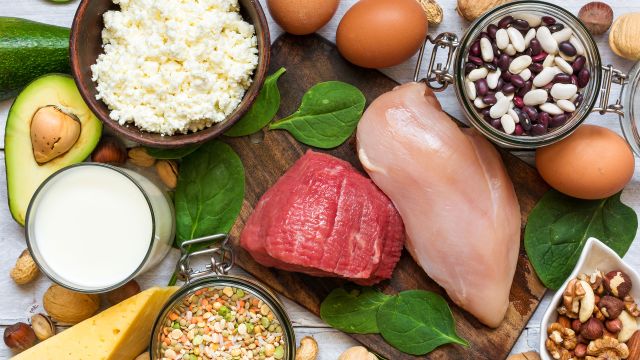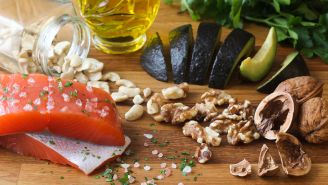Updated on November 5, 2024.
If you follow health news, it might seem like macronutrients go in and out of style with the seasons: Carbs are in, then out. Fats are great, then suddenly bad. But the place of protein in a healthy diet always seems secure. The only question is how much protein to eat?
The answer is complicated. The amount you need depends on many factors including your age, sex, and weight. And though the traditional Western diet is fairly heavy in protein, some people may still not be getting enough on a daily basis.
Current U.S. dietary guidelines recommend that average-sized men aged 19 and older eat 56 grams (g) of protein each day, while women should aim for 46 g. (This is based on the recommended daily dietary allowance of 0.36 g of protein per pound of body weight.)
Once you reach your 70s, though, getting enough protein can become a struggle. And that’s a problem, because according to many experts, you need more protein as you age.
Why protein needs change over time
One-third to one-half of Americans older than 50 do not eat the recommended amount of protein each day, found a 2019 study published in Journal of Nutrition, Health & Aging.
This could be the result of a variety of issues, according to the study authors. The older people involved in the study reported skipping meals, which affected their daily protein intake. The researchers also noted that as people age, their appetite and energy requirements tend to decline. Financial, physical, and mental limitations could also play a role, as can dental issues and problems swallowing.
Why protein is essential
Inadequate protein intake can take a toll on people’s health in several ways:
- In the 2019 study, those who weren’t getting enough protein were also more likely to have lower intake of more than a dozen other nutrients.
- When consumption of protein and other essential nutrients declines, the risks for osteoporosis, hip fractures, and even death increases.
- Inadequate protein intake also contributes to sarcopenia, an age-related loss of muscle mass, strength, and function, which can make even walking down the street more difficult. Some research also suggests that sarcopenia may be linked to an increased risk of developing diabetes.
Although government guidelines don’t specify a higher daily intake for people older than 65, numerous studies have found that 0.36 g of protein per pound doesn’t cut it.
In 2013, an international team of researchers suggested that older people need 0.45 to 0.54 g of protein per pound each day instead, along with two to three days of resistance-training exercise (the kind that strengthens muscles) each week. That’s on top of about 30 minutes of daily aerobic activity. For a person weighing 150 pounds, that works out to 68 to 81 g of protein a day. (To put that into perspective, one 4-ounce piece of skinless rotisserie chicken breast contains about 32 g of protein. One cup of canned black beans contains 16 g of protein.)
The team’s recommendations, which were published in JAMDA, are based on the idea that older people need to consume more protein to maintain their strength and mobility, aid recovery from illness, and offset age-related changes in protein metabolism. The researchers noted, however, that people with severe kidney disease are an exception and should limit their protein intake, as directed by their healthcare provider (HCP).
More protein isn’t necessarily better
The muscle loss that leads to sarcopenia starts years earlier. After age 30, you begin to lose as much as 3 to 5 percent of your muscle mass per decade. Strength training can help slow and protect against sarcopenia, but age-related muscle loss is another good reason to pay attention to your protein intake as you get older.
Keep in mind, however, that eating more protein than is recommended isn’t necessarily better.
“There’s no benefit for anyone who’s generally healthy to eat excessive protein,” says Mark Jakubicki, MS, RD, a dietitian based in New Jersey. “I’ll see someone in a restaurant eating a 20-ounce steak. Nobody needs that.”
As delicious as it may be, a jumbo portion of steak of that size provides nearly 120 g of protein, more than twice the amount most of us need in an entire day.
Some athletes may be an exception to this rule. While training regularly and intensely, athletes should aim to get 0.54 to 0.91 g of daily protein per pound of body weight. If you’re a bodybuilder, you may need even more: 0.73 to 1 g per pound. Talk to your HCP about what level of protein intake is safe and appropriate for you.
How you get protein also matters
Some people may automatically associate protein with steaks and burgers. But eating excessive amounts of animal protein does bring some dangers.
For middle-aged people, excessive animal protein intake is associated with increased risks of cancer and diabetes. Red meat, for example, is higher in saturated fat than lean protein sources like fish or poultry. Excessive intake of saturated fat—which is also found in abundance in processed meats like bacon and sausage—can increase levels of low-density lipoprotein (aka LDL or “bad cholesterol”). This can raise a person’s risk of developing heart disease. Save the marbled steak for special occasions and go for the salmon if you can. If you must have meat, go for a leaner cut like a filet mignon.
Choosing plant proteins like soy, nuts, seeds, or legumes over red and processed meat could help you reduce your intake of saturated fat and excess salt. Plant-based protein sources also provide other valuable nutrients, such as fiber, which offers a range of health benefits.
How to improve your protein balance
If red meat and other animal proteins are a regular part of your current diet, consider these tips to help you incorporate more plant-based proteins:
- Until you get used to eating less meat, write down when and how much you’re eating. It will make it easy to spot patterns and opportunities for small shifts.
- Think of restaurant dining as a chance to try new things. Never had tofu? Try it in a stir-fry instead of meat next time you get Chinese food. Once you find something you like, add it to your menu at home.
- If you love chili, replace half of the meat with kidney, pinto, or black beans.
- Top your salad with beans, nuts, or seeds rather than meat.
- Grab a handful of nuts as a snack.
- Swap white rice for protein-filled quinoa.
- Have peanut butter on whole-wheat toast for breakfast instead of bacon.
If making a list of specific steps feels hard to track, one option is to embrace an overall eating plan that encourages less animal protein.
“I’m a big advocate of the Mediterranean diet,” says Jakubicki. “Seafood twice a week, plenty of beans and nuts, and red meat only once or twice a month. Try to treat meat like a condiment, not the main course.”







